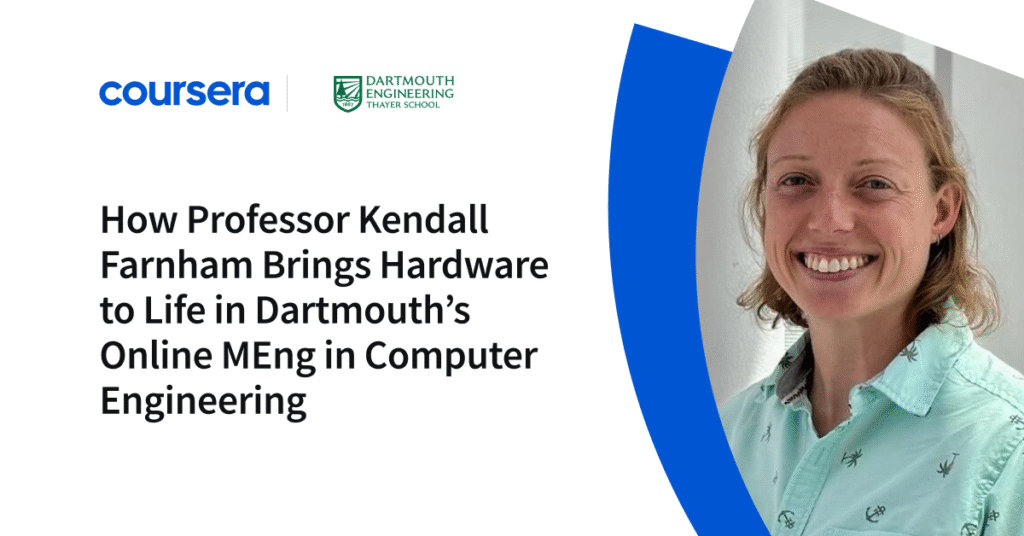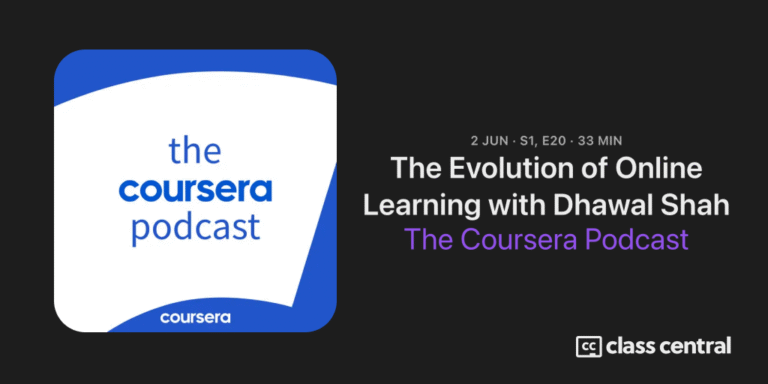
When Professor Kendall Farnham agreed to teach in the online Master of Engineering in Computer Engineering at Dartmouth, she knew it wouldn’t be easy.
“How do we facilitate learning with desktop hardware when I can’t look over your shoulder and tell you that you plugged something in backwards and that’s why it’s smoking?” she laughs.
But for Farnham, the challenge wasn’t a deterrent, it was an opportunity. Her mission: Make the online experience for hardware as compelling and hands-on as the in-person version. It’s the kind of creative, determined energy that defines both the program and her philosophy of engineering education.
From Software to Hardware, and Back Again
Farnham’s path back to Dartmouth (where she earned her undergraduate engineering degree) was anything but conventional. She started in software sales at SAP but quickly realized she was on the wrong track. “Sales was not for me,” she says. So she pivoted to software engineering despite not having a formal software background. “I think like a computer,” she says, simply.
After three and a half years as a software engineer, a fateful recruitment trip to Dartmouth pivoted her path entirely. A conversation with engineering professor Petra Bonfert-Taylor sparked the idea of graduate school. “She told me, ‘You’re getting kind of old,’” Farnham jokes. “I didn’t realize I was an ancient fossil at 26, but it was honestly life-changing.”
She returned for a PhD, earned a NASA fellowship, and built a medical system on an FPGA (field-programmable gate array). And when she realized Dartmouth didn’t offer graduate-level FPGA courses? She built one. “I told my advisor that this type of course was missing, and they said, ‘Great, go teach it.’”
That mindset and personal motto, “Learn it, teach it, break it, fix it,” has come to define her teaching style.
Teaching Hardware Online: Breaking and Building, Together
Having just defended her PhD in February 2024, Farnham was eager to jump into the new challenge of academia, a path she never thought she’d take. However, when told that the course would be taught online, she had an initial moment of panic. She thought: “That’s impossible. Hardware is so hard! How are we going to do this online?”
She was determined to figure out how to bring the hands-on aspects of in-person learning to an online setting. Her approach to online teaching became deeply rooted in trial, error, and collaboration. “My teaching style is: teach 20 to 30 minutes, then do it. And if you do it and fail, you’ll learn.” So, bringing that through in an online setting was her mission.
Farnham understands that not everyone learns the same way and is passionate about making sure her teaching methods are engaging and clear. She records videos showing not just the what, but the why and how:
“I say to myself, this is how I think about the problem, this is the logical flow. Your flow might look different, but here’s my methodology.”
Collaboration in an Online Setting
So, how do you bring that iterative, hands-on energy to an online setting?
“I used Slack to pretend we’re in a computer lab,” she explains. “Screenshots, threads, and questions all worked really well. Nothing is a stupid question, and the students help each other out a lot.”
Despite being officially asynchronous, each online Dartmouth course also makes a point of having two optional synchronous sessions each week. For Farnham’s FPGA course, these were widely popular.
For the hardware courses in the curriculum, Dartmouth also ships physical kits to each student’s home, so that the learning can be truly hands-on.
In her instruction, Farnham combines documentation, hardware-cam demos, whiteboard explanations, and even efforts to gamify some of the content. “Basically, I think about how I can give you this information in every possible way. Whatever clicks for you, clicks.”
Having been a recent student herself, she is also immensely meticulous about the type of material she provides to her students.
“I’ll record an instructional video and always watch it back. If I’m bored watching it, I’ll re-record it and try to find ways to make it more interesting. If I don’t want to watch it, why would you want to?”
The Dartmouth Difference: Learning to Learn
What makes Dartmouth’s online MEng in Computer Engineering so powerful, Farnham says, isn’t just the content. It’s the mindset.
“The truth is, tech is changing so quickly. What you learn today as the gold standard might not be the standard in 12 months. We teach you how to learn, and how to keep learning.”
From hands-on FPGAs to the concepts of machine vision, the program’s projects tie directly to real-world industry challenges. “In the FPGA course, we’ve had learners apply their project directly to their job. That’s the goal: make it tangible.” The coursework is designed to have use cases across a multitude of industries.
Now embarking on her new machine vision course, she takes students through weekly case studies across fields like underwater robotics, agriculture, and aerospace. “The Mars Rover was built on an FPGA. You start with a camera and ask: How do you communicate the data? What are the mechanical challenges? You can plug this into any industry.”
Her goal is for each student to be an effective learner and communicator. “You can be a really smart engineer, but if you can’t communicate your design, you might as well not be an engineer. Engineering affects everything; you cannot work in a silo.”
Advice for Future Engineers: Be Curious. Take Risks.
Farnham never expected to become a professor. “I needed a change at work and wanted to expand into hardware. I know tons of people who have totally pivoted their careers because they learned something new, and that’s what I did,” she says. But now she’s a Dartmouth “lifer” and passionate about expanding access to engineering education.
“If you’re curious about what else is out there beyond your immediate bubble, go explore,” she says. “If you’re thinking about grad school and not sure why, but something’s pulling you, try it. What do you have to lose?”
Her advice? Be open. Stay adaptable. “Planning is good, but don’t tie yourself to the plan. You might learn something new and pivot. That’s what engineering is. It’s problem solving, rethinking, and iterating. Just like life.”
Ready to take the next step?
If you’re curious, ambitious, and eager to understand how things work and how to make them better through intelligent systems, Dartmouth’s online Master of Engineering in Computer Engineering might be your next step. With professors like Kendall Farnham leading the way, you won’t just learn hardware. You’ll learn how to learn, think, and communicate, 100% online, hands-on, and head-first into the future.
The post How Professor Kendall Farnham Brings Hardware to Life in Dartmouth’s Online MEng in Computer Engineering appeared first on Coursera Blog.


